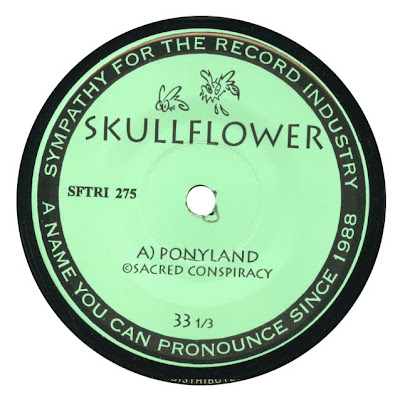
Hello! Being invited to contribute to this blog has made me think quite a bit about my relationship to the nature of many aspects of culture - records, music, writing, journalism, the internet - knowledge, facts, storytelling - collecting, materialism, fetishism. I'm excited to muse about these things in public for the next 2 weeks, as I present the labels of 14 records that happen to be in this apartment with me right now, for one reason or another.
I used to "collect" 78's - or well, seek them out at least. They were (are?) always so cheap, and are a great way to educate yourself about old music, the early days of recording, manufacturing and design. They can also sometimes be an astounding way to glimpse at the very end of an era in humanity's relationship to music. The way that these discs instantly rocketed to every corner of the globe, and changed the way that people relate to the music that they are playing, as well as their methods and reasons for listening to music will always fascinate me.
Well, I move around a lot, and this is the only 78 I have at the moment. It was given to me by
Brian Belot. Brian's art & life seems to be centered around the amassing & re-purposing of a vast amount of stuff. I love this about him, and was psyched to see his huge pile of old records while visiting him in NYC. I thought this label looked amazing. He just handed it to me, and told me I could have it. It was so nice to meet someone who appreciated and was excited about old records, but also saw these objects as things that should be shared, and passed on. I had a feeling this record would get cracked in my luggage, which it did. Oh well. I apologize to historians if thing is rare, but I kind of doubt that it is.
The labels of 78's are always the most beautiful. I've come across some sites similar to this one that are dedicated to displaying them. It's not just that old things are always prettier, I think it's just that it was so much harder & unique to make things back then, that so much more care went into them? Well, printing was of course so much better and carefully done in the past. I used to live in Cambridge, and there were of couple of 78 collector dudes who showed me how to tell where & when certain ones were made, how to tell which were recorded with electricity, what the different colors of the labels meant, why silver ink was used, etc.
So, an "Aeolian harp" is an ancient idea of music that is played by the wind, right? Cool... So, as I am looking it up now, it seems that the history of
The Aeolian Company is also quite fascinating. They produced piano rolls, built player pianos & organs, and introduced the first one that also could also
record what was being played by punching holes into the rolls? There's a lot of early jazz & stuff that was only recorded in this way, right? So - this record would have been their way of attempting to adapt to a new, emerging technology, eh? This record originally cost 85¢. That would have made it quite expensive in 1916, right? I notice that the company, and this label was later absorbed into other larger corporations - AND!
"It was Congressional suspicion of the market power of the Aeolian company during the early 20th century that prompted adoption of the first compulsory license system in U.S. copyright law, for the mechanical reproduction of musical compositions, a category that included piano rolls."
Hm! I didn't mean to start writing about this, but please remember people - the recording, selling, and concept of "owning" music, even the music we create ourselves, is still very new in the history of humanity. Don't get too upset about it. We will always be able to play & listen to music - and best of all, we can still make & listen to records!










































